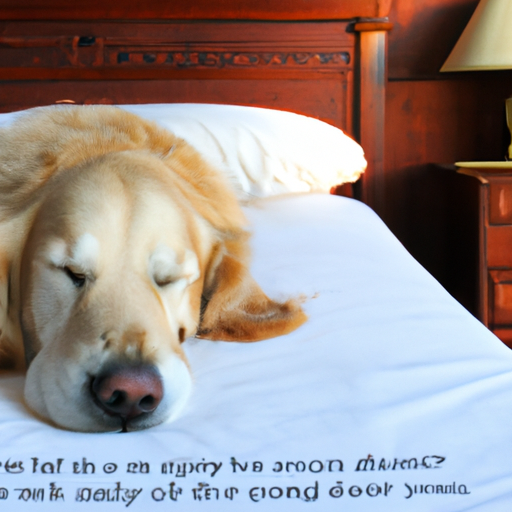As a caregiver to your beloved pet, you might have noticed your dog’s strange sleeping habits. One question that may have crossed your mind is: “Why does my dog sleep at my head?” You are not alone in this query. Many dog owners have asked the same question. So, why do they do this? Let’s dive into the possible reasons and understand this peculiar canine behavior.
1. Sense of Security
As a dog owner, you’re well aware that your pets thrive on routine and predictability. Sleeping at your head provides them with a sense of security and comfort.
- Your Presence: Dogs are pack animals by nature. By sleeping near you, they’re simply following their instinct to stay close to their pack leader for protection. This way, they can alert you to any potential danger that may arise during the night.
- Consistent Environment: Your consistent presence and your scent provide a comforting environment that aids in their sleep.
- Protection: They also feel a sense of duty to protect you. By sleeping at your head, they can react more quickly to any perceived threats.
2. Bonding and Affection
The bond between you and your dog is unique and strong. This bond can manifest in various ways, including their sleeping habits.
- Pack Bonding: Sleeping together is a common bonding activity among pack animals. Your dog sleeping at your head may simply be their way of strengthening the bond between you.
- Affection: It’s also a sign of affection. Your dog loves you and wants to be close to you, even when sleeping.
3. Temperature Regulation
Dogs have a higher body temperature than humans. They might choose to sleep at your head for temperature regulation purposes.
- Warmth: Your head is one of the warmest parts of your body. Dogs might find this warmth comforting, especially during colder months.
- Heat Exchange: Dogs can lose heat through their heads, just like humans. Sleeping near your head allows them to benefit from your body heat.
| Dog Sleeping Position | Reason |
|---|---|
| At Your Head | Security, Bonding, Heat Regulation |
| At Your Feet | Space, Independence |
| On Your Bed | Comfort, Affection |
| In Their Own Bed | Training, Personal Space |
4. Behavioral Factors
Behavioral factors also play a crucial role in why dogs choose to sleep at your head.
- Habit: If your dog has been doing this since they were a puppy, it might simply be a habit that they’ve carried into adulthood.
- Training: If you’ve inadvertently rewarded your dog for sleeping at your head, they will continue this behavior because they associate it with positive reinforcement.
5. Health Concerns
While most reasons are benign, a sudden change in your dog’s sleeping position could indicate a health issue.
- Anxiety: Dogs with anxiety often seek comfort by sleeping close to their owners. If your dog is suddenly sleeping at your head, it might be a sign of anxiety.
- Illness: If your dog is feeling unwell, they might seek out your presence for comfort.
Always consult with a vet if you notice drastic changes in your dog’s behavior.
Frequently Asked Questions
1. Should I let my dog sleep at my head?
This depends on your comfort and your dog’s behavior. If it doesn’t disturb your sleep and your dog seems happy, there’s no harm in it.
2. How can I discourage my dog from sleeping at my head?
You can train your dog to sleep at a specific spot using positive reinforcement. Gradually move them from your head to the desired sleeping spot.
3. Can sleeping at my head harm my dog?
Generally, no. But if your dog is showing signs of anxiety or illness, it’s best to consult a vet.
4. Why does my dog sleep at my feet sometimes?
Dogs sleep at feet for several reasons. They might need more space, or they might be showing independence.
5. Can I change my dog’s sleeping position?
Yes, with patience and consistent training, you can influence your dog’s sleeping position.
Remember, every dog has unique behaviors and preferences. While these points provide a general understanding, the reasons may vary from dog to dog. As their caregiver, you are the best judge of their behavior and needs.



